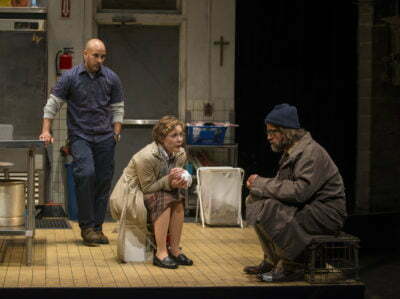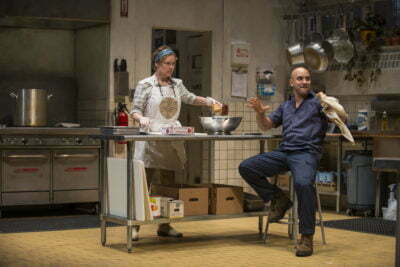Grand Concourse
By Heidi Schreck

Directed by Yasen Peyankov
Produced by Steppenwolf Theatre Company, Chicago
What’s Forgiveness For?
Grand Concourse, a Midwestern premiere at Steppenwolf, is another one of the plays currently running in Chicago that examines the question: what do we mean by calling someone a “good person?” Playwright Heidi Schreck’s angle is to interrogate the concept of forgiveness. By praising it, do we make it mandatory, and therefore insincere and counterproductive? Particularly in Christianity, in which encouraging forgiveness is one of the core ethical concepts, does the traditional notion of granting forgiveness more readily in the absence of malicious intent really make sense? And what does forgiveness mean, anyway? These are all questions raised by a script with rich characters, in a production directed by Yasen Peyankov that reminds us of why they are so important to ask.
The difficulty though, is that Grand Concourse contains some major plot twists and revelations that work best as surprises, but the play is almost impossible to analyze without mentioning them. Therefore, readers will have to trust me and the other reviewers’ assurances that the play is well worth seeing, without knowing exactly why. The set-up is that Shelley (Mariann Mayberry) is a Roman Catholic nun who runs a soup kitchen out of a church in the Bronx, and lately has been having doubts about whether she’s really making enough of a difference to justify the massive amount of time and energy she invests in it. Partly it’s the rising demand for the kitchen’s services that troubles her, but mainly her doubts are due to the impending death of her father, whom she always hated, and the realization that she is incapable of practicing her religion’s teachings extolling reconciliation. She is surprised one day by the arrival of a new volunteer, nineteen-year-old Emma (Brittany Uomoleale), who is lonely, battling cancer, and searching for a way of doing some good in the world.

Emma clearly needs the soup kitchen as more than it needs her, but Shelley welcomes her anyway, and takes a liking to her. The security guard, a young Dominican named Oscar (Victor Almanzar), flirts with Emma, despite having a girlfriend he wants to marry. When Emma reveals that she has bouts of self-hatred and depression, Oscar wisely decides that he should admire her only from a distance, but she returns his affections much more aggressively, and Oscar’s been feeling some insecurities in his romantic relationship recently, so one thing leads to another. Emma also develops a friendship with Frog (Tim Hopper), a homeless mentally ill hippie, who thinks he can push her around until she displays strength enough to stand up to him, and starts getting him some of the actual help he needs, instead of just keeping him barely alive. Shelley is impressed, and starts to rely on Emma despite her misgivings and the first major plot twist, but continues to struggle with her faith, and derives solace more from her orange cat Pumpkin than any human connection.

Mayberry’s performance is incredible in the range of feelings she plays out as Shelley. She is never cynical, but is as pragmatic about protecting her feelings as she can be while still drawing on them for strength. Sometimes Shelley makes mistakes, and then Mayberry displays hurt, coupled with admirable determination to put things right. Uomoleale, who is new to Chicago, is just as complex and realistic as a young woman desperate for friendship, but mentally ill in a way that makes her consider herself unworthy of it, and leads her to demonstrate to others she is, as well. My only major problem with the script is that in her relations with Oscar, she is too obviously unhinged all the time, and Almanzar has to make him incredibly stupid to trust her. Realistically, for their relationship to grow, there should be long periods when she’s stable, which she is with Shelley, but not with him. Tim Hopper (who will be replaced by Francis Guinan on August 11) is an annoying, but pitiful Frog, and it is easy to see why Emma develops an attachment to him. Joey Wade’s scenic design is centered on an actual kitchen sink, but the darkened interior of a church undergoing remodeling looming over the playing space is an effective embodiment of Schreck’s themes.
Yasen Peyankov clearly directed this play with great attention to the characters’ moral struggles, and the pain they feel when they come into conflict. Following each performance that is part of the subscription season is a talk-back, and the one I went to, like the one following Congo Square’s Twisted Melodies, another play about mental illness, was among the best I’ve heard so far. That night’s audience was interested in why so many people had such different feelings about Emma and Frog. The difference in perception cuts to the heart of the relationship between culpability and response to harm, and it was a debate the audience was genuinely interested in having. So well-done to Steppenwolf for achieving the kind of engagement so many theatre artists claim to long for. Grand Concourse is a play that contains something close to everyone’s heart, and will remain with you for a long time.
Highly Recommended
Jacob Davis
[email protected]
Reviewed July 14, 2015
This show has been Jeff recommended.
For more information, see Grand Concourse’s page on Theatre in Chicago.
Playing at Steppenwolf in the Downstairs Theatre, 1650 N Halsted. Tickets are $20-89; to order, call 312-335-1650 or visit Steppenwolf.org. Plays Tuesdays-Saturdays at 7:30 pm, Saturdays and Sundays at 3:00 pm through August 30. Running time is one hour and forty-five minutes with no intermission.
